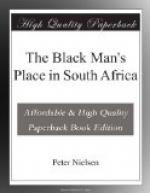There are, I know, some white men who talk knowingly about a Native mind which they allege to be unlike their own, a mind of whose strange anfractuosities they profess a special knowledge, but these people must not be taken seriously. They are always half-educated men, suffering, as Cardinal Newman said, from that haziness of intellectual vision which is so common among all those who have not had a really good education. These people pretend to a knowledge which is impossible, seeing that we can only know and understand the minds of other people by assuming that they are like our own so that if we postulate a Native mind different from our own it must of necessity remain unknowable by us, for what is psychology but the power of understanding others from our understanding of ourselves?
The judge on the bench and the priest in the confessional follow the thoughts and feelings of the minds they have to deal with, not by virtue of any special power of divination, but simply by judging their fellow-men’s way of thinking and feeling to be even as their own.
The truth of the matter is that all men think in the same way, but not always about the same things. There is no such thing as an inherent racial mind but there are different national and racial cultures lasting sometimes for centuries, like that of China, and some times only for a generation, like that of modern Germany. But these differences are temporary and outward and not inwardly heritable. The difference between the mind of the philosopher and the plough-boy is one not of kind, not even of degree, but of content. The things that occupy the mind of the peasant farmer are not the same that fill the mind of the university don, but if the respective environments of the two types had been reversed the professor might have thought about manure and the farmer about metaphysics. And this holds good also of nations and races. Consider, for instance, the German people who before the rise of Bismarck were looked upon as a nation of peaceful peasants and Gelerhten, “ces bons Allemands,” in contemporary French parlance, and how they became within a few years through being made to think constantly about their own national supremacy, a race of ruthless warriors that terrorised and nearly conquered Europe in the Great World War. The mind of the German race had not been changed, but the main business of that mind had been changed through the imposition on the growing masses of a new ideal, the ideal of dominion in the hands of the German people.
The difference between the mental status of the white man and the Native is the same as that which we notice between the man who has had a liberal education and the man who has not, and it lies mainly in the fact that the one is given to introspection, analysis and criticism whereas the other, whether he be a European peasant or a Bantu herdsman, looks outward, takes things for granted and asks no questions, so that with the Bantu as with the illiterate European, the primitive thoughts and ways of their forefathers are held good enough by their sons, but this does not preclude the latent potentiality in both for the understanding and acquisition of new thoughts and ways once the shackles of conservatism have been loosened and cast aside.




